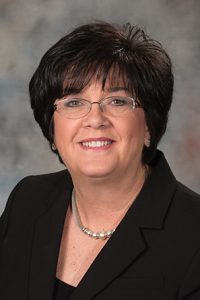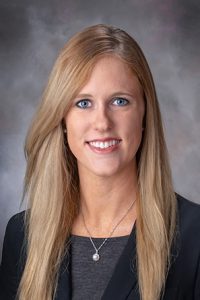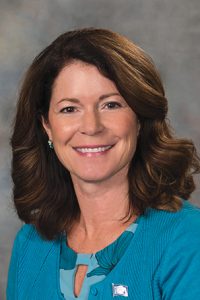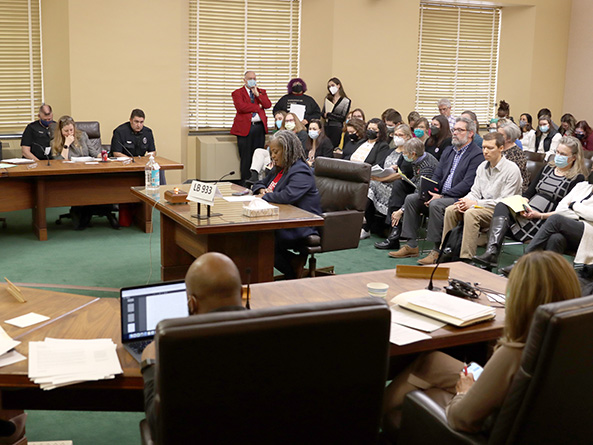Abortion ban, restrictions considered
The Judiciary Committee heard testimony Feb. 24 on three bills that would change abortion regulation in Nebraska. One proposal would ban all abortions in the state while the other measures would restrict access to the procedure.

LB933, introduced by Thurston Sen. Joni Albrecht, would ban abortion in Nebraska if states are given full regulatory authority over the procedure. The bill would become operative contingent upon one of the three national “triggering” events: if the U.S. Supreme Court overturns Roe v. Wade, Congress enacts a law giving states complete authority to regulate abortion or the U.S. Constitution is amended to give states that authority.
The bill would prohibit both medical and chemical abortions starting at fertilization. A physician who knowingly violates the bill’s provisions would be subject to a Class IIA felony charge, which carries a maximum penalty of 20 years imprisonment.
A physician charged under the bill’s provisions could claim a defense that a procedure was necessary to prevent a woman’s death. A woman who attempts or has an abortion would not be liable under the bill. Medical treatment provided by a licensed physician that results in accidental death or injury of an unborn fetus also would not be a violation.
Albrecht said both women and children are worthy of being loved and deserve better than abortion. LB933 is not just pro-life, she said, it’s pro-women, pro-baby and pro-science.
“In Nebraska, there have been almost 200,000 abortions since Roe v. Wade was decided in 1973. That’s 10 percent of our state’s population,” Albrecht said. “Every abortion ends the life of an innocent human being — a baby that is alive, growing and has their own unique DNA separate from their mother.”
Sandy Danek, executive director of Nebraska Right to Life, testified in support of LB933. A debate that began almost 50 years ago by proclaiming support for women’s rights now harms women, Danek said, by pressuring them to have abortions because children are viewed as a threat to their freedom.
“If we as a society truly care about women and the unplanned pregnancy, then we must look to life-affirming options that are before us,” Danek said.
Testifying on behalf of Nebraska Family Alliance, Nate Grasz also spoke in favor of the bill. All people have the inherent right to life, he said, by virtue of their humanity and not because it is granted to them by the government or other people.
“Nebraskans know it is inconsistent and unsustainable that our laws recognize the intentional death of a child in the womb as fetal homicide when they’re wanted, but when that life is ended in an abortion clinic, it’s called reproductive care,” Grasz said.
Scout Richters spoke in opposition to the bill on behalf of the ACLU of Nebraska. The decision of whether and when to become a parent is one of the most important life decisions a person faces, Richters said, and the government is in the worst position to make that decision for Nebraska families.
“When someone has made the decision to have an abortion, they should be able to get one without being forced to delay care, get on a plane to another state or carry a pregnancy against their will, as we’ve seen become a reality in Texas,” she said. “This bill has nothing to do with supporting Nebraskans and everything to do with denying them essential care, dignity and the ability to determine their own futures.”
Christon MacTaggart, executive director of the Nebraska Coalition to End Sexual and Domestic Violence, also testified in opposition to LB933. She said the bill would add barriers to care for domestic abuse and sexual violence survivors.
“If a pregnant person is experiencing abuse, not being able to access a full range of reproductive health care will put their safety in jeopardy and offenders will use it to keep victims under their control,” MacTaggart said.
The committee also considered two bills that would restrict abortion access but would not enact an outright ban.

LB781, introduced by Sterling Sen. Julie Slama, would require a physician to perform an ultrasound prior to an abortion for the purpose of detecting a fetal heartbeat and record the estimated gestational age of the fetus. Knowingly performing an abortion after a fetal heartbeat is detected would be illegal, except in cases of a medical emergency.
Under the bill, a physician who knowingly performs an abortion after a fetal heartbeat has been detected could face a Class IIA felony charge, which carries a maximum penalty of 20 years imprisonment.
“By six weeks gestation, an ultrasound can pick up a baby’s heartbeat,” Slama said. “When we hear this sound, we know that we are listening to the rhythm of life coming from a tiny human being in his or her earliest moments. Abortion stops that beating heart.”
LB1086, introduced by Lincoln Sen. Suzanne Geist, would establish a safety protocol to prohibit anyone but a physician from providing an abortion-inducing drug. The bill also would prohibit an abortion-inducing drug from being mailed or otherwise delivered.
Intentional violation of those provisions would be a Class IV felony, which carries a maximum penalty of up to two years imprisonment, a $10,000 fine or both.

LB1086 also would require a physician to file a report with the state Department of Health and Human Services detailing all encounters with a patient directly affected by an abortion-inducing drug, including any complications experienced. Intentional failure to file a report would be a Class II misdemeanor.
A woman upon whom an abortion is attempted, induced or performed would not be subject to prosecution under either LB781 or LB1086.
Geist said chemical abortions make up over 70 percent of abortions performed in Nebraska and that there currently is no prescribed standard of care. The bill would limit the use of chemical agents to the first seven weeks of pregnancy because the risk of complications increases each week after that, she said.
“Currently, there is little to no reporting of chemical abortions and complications in our state and therefore no accountability or follow up with women who have complications,” Geist said. “Since this accounts for such a large majority of abortions in our state, advocating for safety measures seems to be a commonsense solution and in the best interest of women.”
John Quinn spoke in favor of both bills on behalf of the Democrats for Life of America Education Fund, saying LB781 would protect the dignity of unborn children and open “more dignified horizons” for their mothers. In addition, the regulations under LB1086 would prevent “modern day back-alley abortions” from occurring, he said.
“Leaving women to administer powerful drugs in their bathroom is no way to safeguard their health,” Quinn said.
Testifying on behalf of the Nebraska Catholic Conference was Marion Miner, who also spoke in support of both bills. Between 5 and 20 percent of women suffer from a chemical abortion-related complication, Miner said, but almost none of these cases are reported by Nebraska abortion clinics.
Testifying in opposition to both bills was Deborah Turner, associate medical director of Planned Parenthood North Central States. She said the safety and efficacy of medication abortions up to 70 days gestational age is well-documented and there is no reason to decrease the time frame to 49 days.
“Serious complications associated with abortion are exceedingly rare, occurring in less than a fraction of a percent of medication abortion patients,” Turner said.
Andi Curry Grubb, state executive director for Planned Parenthood North Central States, also testified in opposition to both bills, which she said would place limits on abortion before many women know they’re pregnant.
A 2020 report from the state Department of Health and Human Services showed that less than 2 percent of patients received abortions at that stage of pregnancy, Curry Grubb said.
The committee took no immediate action on any of the proposals.


